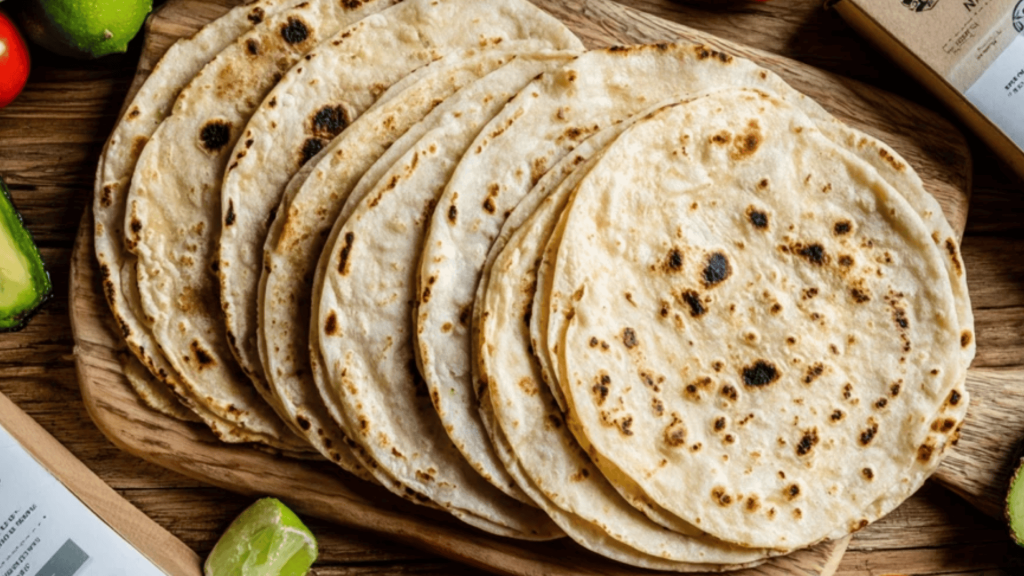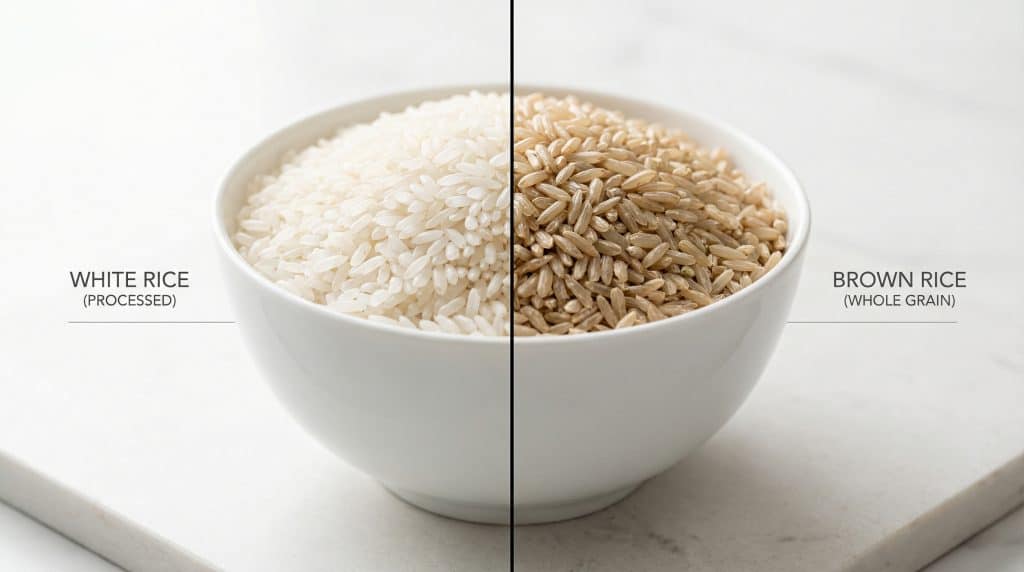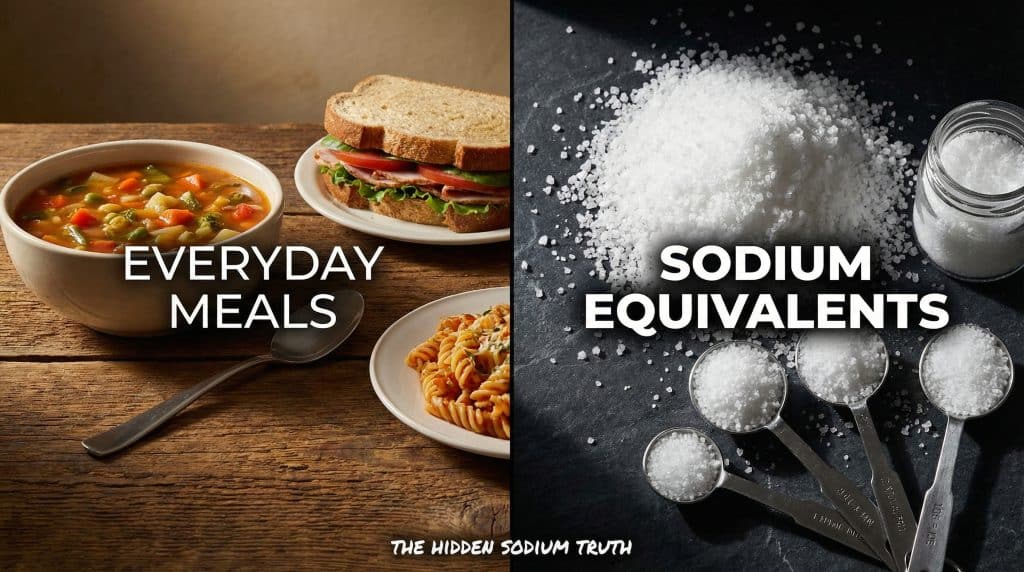Flour tortillas might look simple, but they hold more surprises than most people expect.
They slip into burritos, wraps, quesadillas, and soft tacos with ease, yet their nutritional profiles can vary widely from one brand to another.
Some tortillas pack just 70 calories while others climb past 200, all depending on size, ingredients, and how they’re made.
A few stick to classic flour-and-water formulas, while others add oils, preservatives, or extra fiber to meet different dietary goals.
With so many versions lining shelves, from soft, traditional styles to low-carb and high-fiber options, it’s worth paying attention to what you choose.
Even small shifts in ingredients or portion size can change the entire nutritional picture.
Why Flour Tortillas Are Loved in Every Kitchen
Flour tortillas are soft, wheat-based flatbreads loved for their versatility and comforting texture.
Made from a simple mix of wheat flour, water, fat, salt, and sometimes baking powder, they’re known for being easy to fold, roll, and wrap without cracking.
The added fat is what gives them that signature softness people enjoy in burritos, quesadillas, and enchiladas.
Their mild, slightly sweet flavor is another reason they’re a favorite, neutral enough to complement any filling, from savory meats to fresh veggies.
Unlike corn tortillas, which carry a stronger, earthy taste, flour tortillas let the ingredients inside shine, making them a go-to choice in many homes.
Typical Flour Tortilla Nutrition
Flour tortilla nutrition varies widely, especially by size. Comparing calories, carbs, and sodium helps you choose the best option for your meals.
| Nutrition | 8-inch (51g) | 10-inch (71g) | 12-inch (90g) |
|---|---|---|---|
| Calories | 146 | 210 | 260–280 |
| Carbohydrates | 25g | 35g | 45g |
| Protein | 4g | 6g | 7g |
| Fat | 3.5g | 5g | 7g |
| Fiber | 1.6g | 2g | 2.5g |
| Sodium | 391mg | 520mg | 650mg |
These numbers show how quickly nutrition changes with tortilla size, making it easier to choose portions that align with your health and goals.
Brand-Specific Flour Tortilla Nutrition
Different flour tortilla brands vary widely in calories, carbs, ingredients, and texture, making brand comparisons essential for choosing the healthiest option.
1. Mission Foods
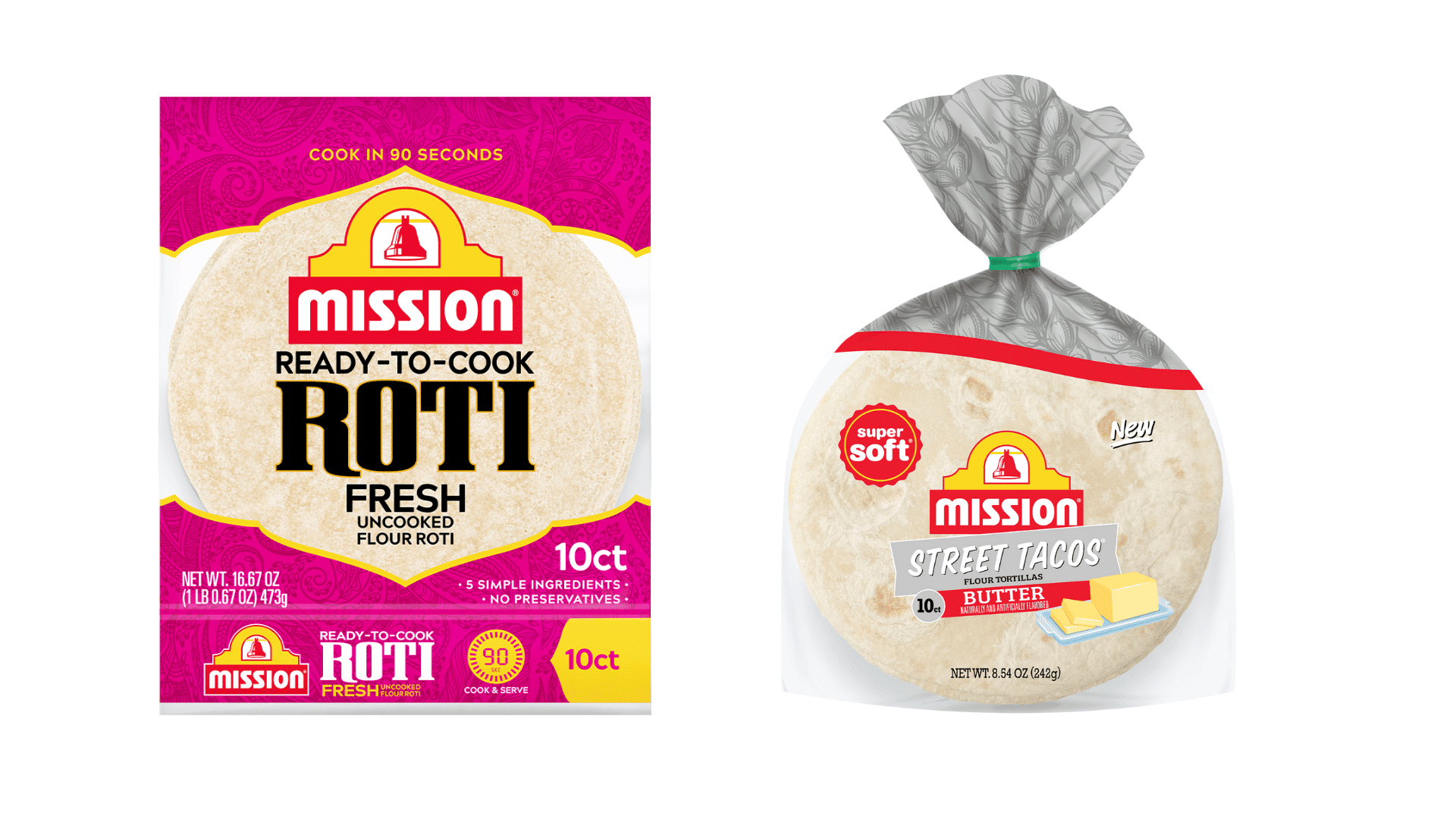
Mission Foods is the largest tortilla brand in the U.S., offering classic, low-carb, and street-taco flour tortillas with noticeable differences in calories, carbs, and sodium.
- Wide product variety for every need
- Popular low-carb Carb Balance line
- Consistently soft and flexible textures
Mission works for shoppers seeking convenience, flavor, and options, especially those looking for low-carb tortillas that don’t sacrifice softness or usability.
2. La Tortilla Factory
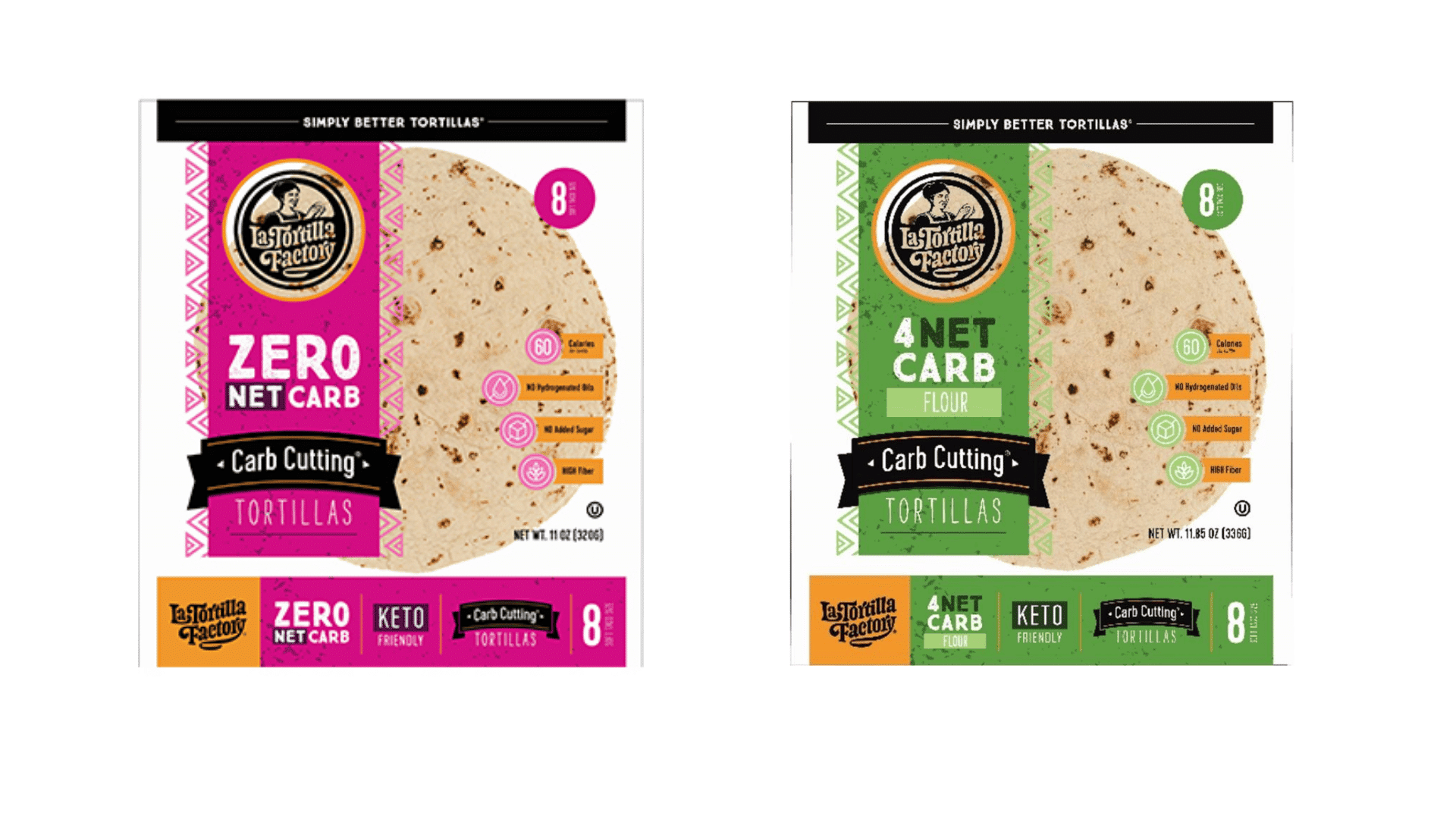
La Tortilla Factory focuses on health-minded tortillas made with non-GMO ingredients, higher fiber, and whole-wheat options ideal for balanced eating and cleaner ingredient preferences.
- High-fiber, low-carb choices
- Cleaner, non-GMO formulations
- Strong focus on whole-wheat nutrition
These tortillas appeal to consumers seeking better nutrition, fewer additives, and whole-grain benefits, while maintaining a soft, easy-to-wrap texture.
3. Guerrero Tortillas
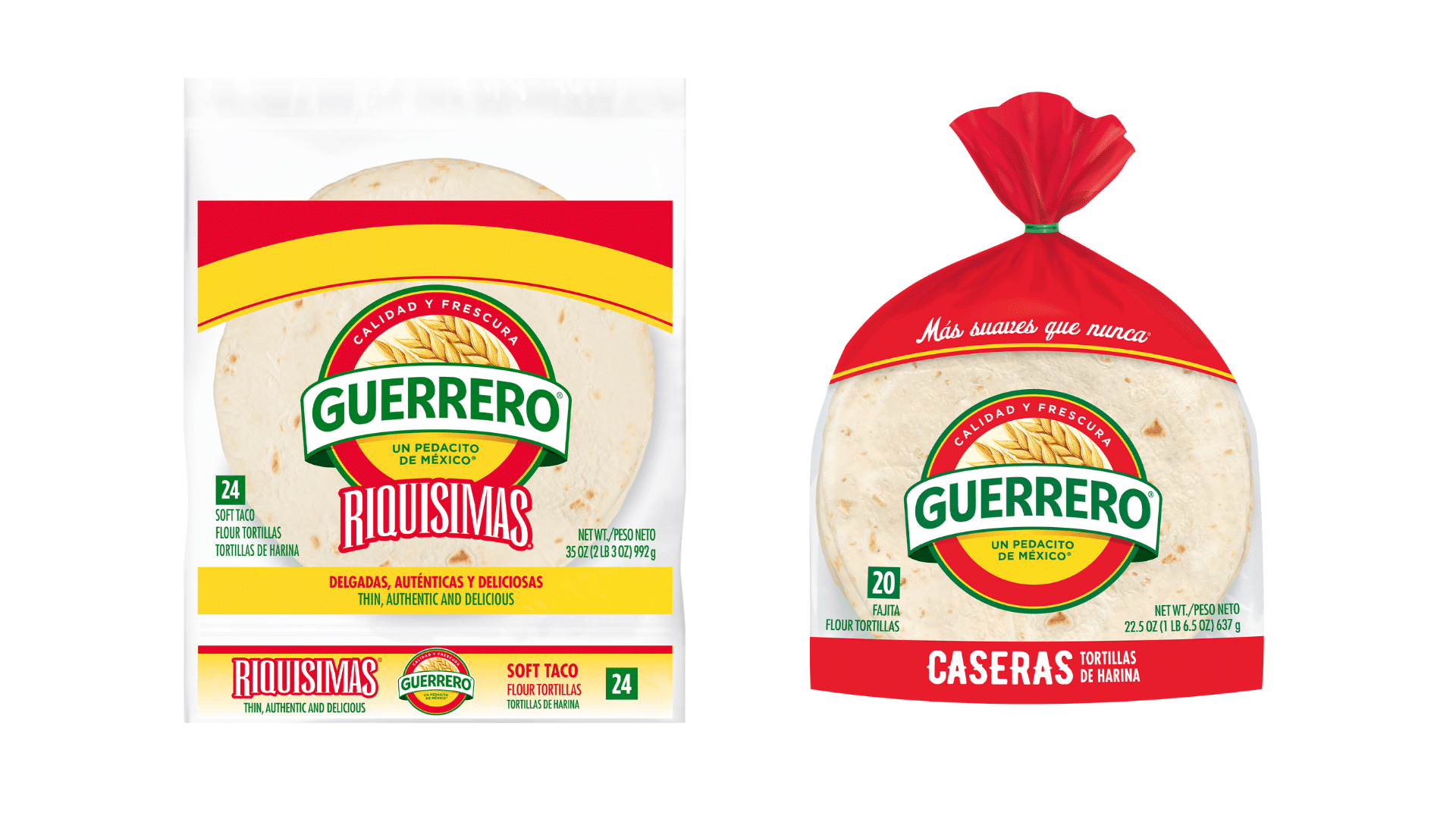
Guerrero makes genuine Mexican-style tortillas known for their soft, sturdy texture and balanced nutrition, offering a more traditional flavor compared to mainstream flour tortilla brands.
- Genuine Mexican-style taste
- Soft yet durable texture
- Fewer preservatives than many big brands
Guerrero fits those who prefer traditional flavor and reliable texture, especially for tacos and burritos requiring a sturdier flour tortilla.
4. Other Brands Worth Knowing
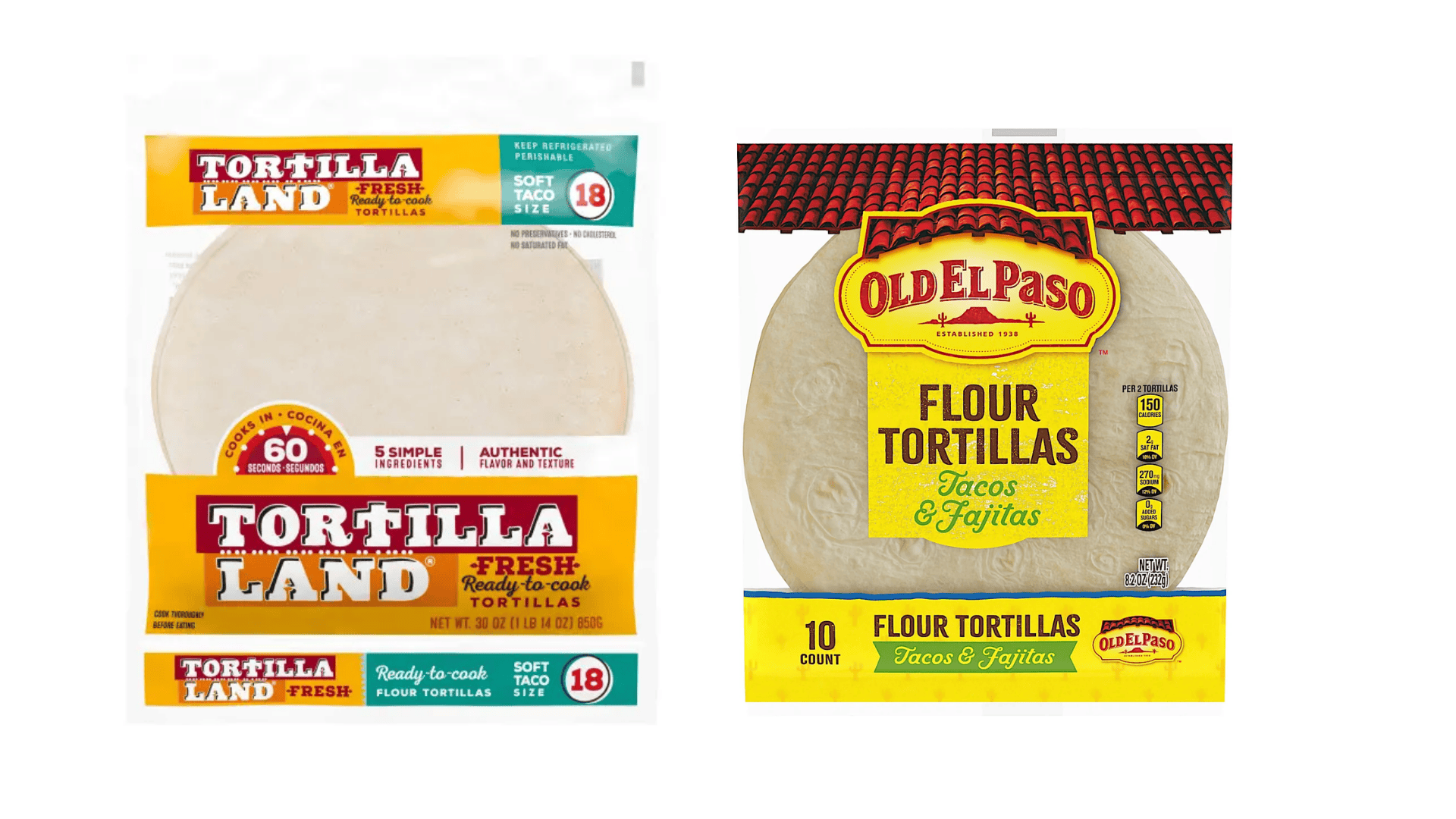
Several other tortilla brands offer unique benefits, from affordability to grain-free ingredients, giving shoppers more choices based on taste, texture, and dietary needs.
-
Old El Paso: A budget-friendly grocery staple with nutrition similar to Mission’s regular tortillas, making it a dependable, affordable option for everyday meals and simple recipes.
-
TortillaLand: Uncooked tortillas you finish at home, offering a fresher taste and thicker texture, though slightly higher in calories due to traditional preparation.
-
Siete Foods: Grain-free tortillas made with cassava and coconut flour, ideal for gluten-free or paleo diets, offering a soft texture and a lower-carb profile.
These brands expand the tortilla aisle with budget options, fresher styles, and grain-free alternatives, helping everyone find a tortilla that fits their lifestyle.
What to Look For When Buying Flour Tortillas
Choosing the right flour tortillas means checking nutrition, serving size, ingredients, sodium, and fiber to make smarter, healthier decisions every time.
- Check Serving Size: Compare tortillas by gram weight to avoid misleading calorie and carb differences across brands.
- Review Calories and Carbs: Larger tortillas often double calories, so select sizes that match your nutritional needs.
- Watch Sodium Levels: Many tortillas are high in sodium, making reduced-sodium or smaller options better for heart health.
- Look for Higher Fiber: Whole wheat or high-fiber tortillas support digestion, fullness, and steadier blood sugar levels.
- Read Ingredient Lists: Choose tortillas with fewer additives and avoid trans fats, added sugars, and overly processed ingredients.
Focusing on these simple checks helps you choose better tortillas that balance taste, nutrition, and convenience without complicating your shopping decisions.
How Flour Tortillas Are MadeTraditional Method: Flour is mixed with fat, water, and salt, then kneaded until smooth. The dough rests, gets rolled into thin discs, and cooks on a hot griddle until soft, lightly browned, and slightly puffy. Industrial Method: Factories use automated mixers, rollers, and die cutters for consistent dough and perfectly shaped tortillas. High-speed tunnel ovens bake them in seconds, while preservatives and stabilizers keep them soft and fresh longer. |
Corn Tortilla vs Flour Tortilla
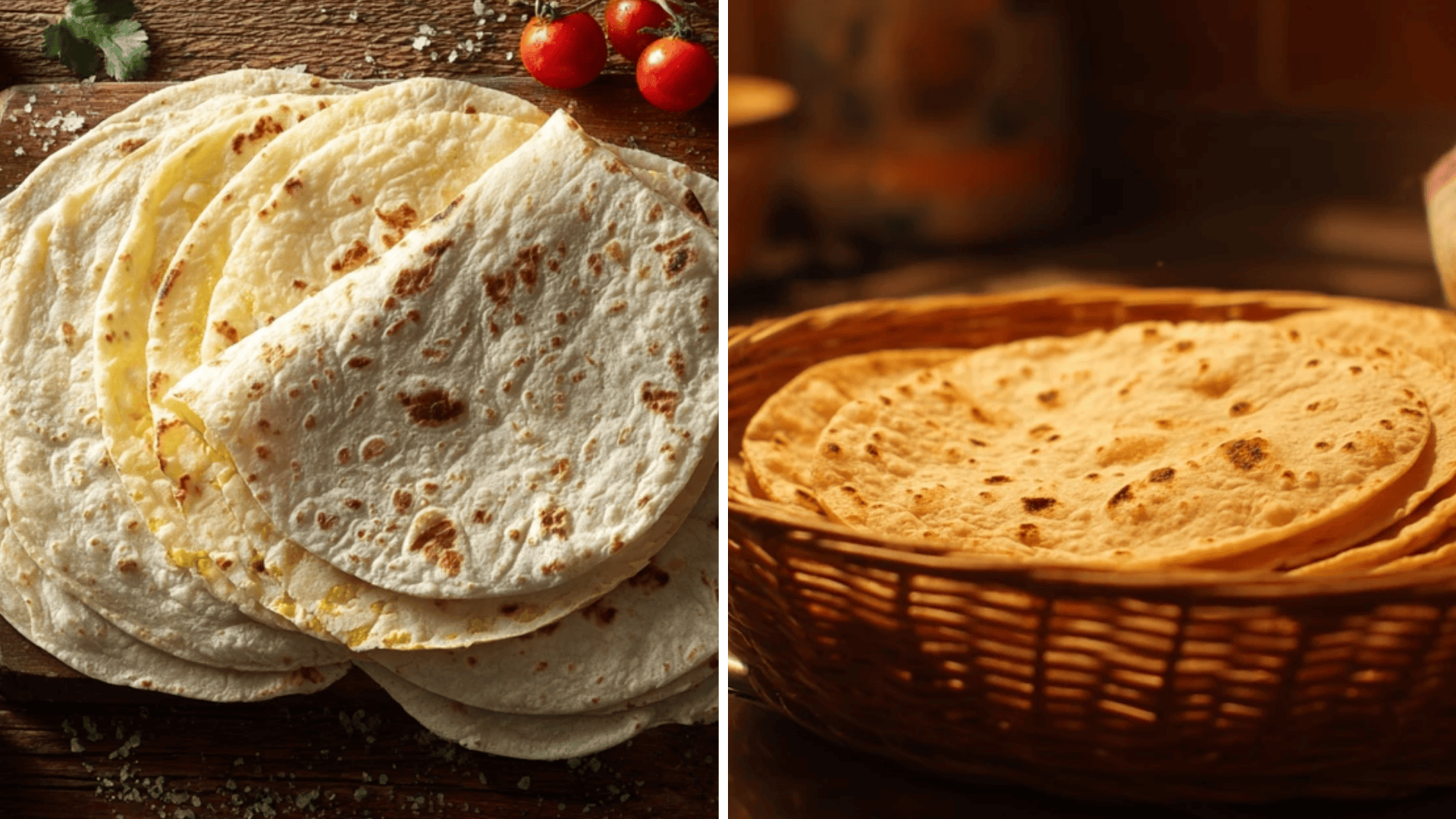
Comparing corn and flour tortillas highlights key nutritional differences, making it easier to choose the option that best suits your preferences and goals.
Nutrition Comparison
Nutritional values differ significantly between corn and flour tortillas, even when they are the same size, so understanding these differences can guide healthier choices.
| Nutrition | Corn Tortilla (6-inch) | Flour Tortilla (6-inch) |
|---|---|---|
| Calories | 50–60 | 90–110 |
| Carbohydrates | 11g | 17–20g |
| Protein | 1g | 3–4g |
| Fat | 0.5g | 2–3g |
| Fiber | 1.5g | 1g |
| Sodium | 10mg | 200–250mg |
Corn tortillas are lower in calories, fat, and sodium, while flour tortillas offer more protein and a softer, more flexible structure.
When to Choose Each Type
Knowing when to reach for corn or flour tortillas depends on your nutritional needs, texture preferences, and the kind of meal you’re preparing.
Choose Corn Tortillas When:
- You want fewer calories
- You need gluten-free options
- You prefer authentic Mexican flavor
- You’re making tacos or tostadas
Choose Flour Tortillas When:
- You need a tortilla that bends without tearing
- You’re making quesadillas, wraps, or small burritos
- You prefer a mild, neutral flavor
- You want more protein per serving
Both tortilla types offer unique benefits, and understanding their differences makes it easier to select the one that best complements your meals and goals.
Are Flour Tortillas Healthy?
Flour tortillas can be healthy depending on your goals and how often you eat them.
They offer quick carbohydrates for energy, a small amount of protein, and many brands fortify them with nutrients like iron, calcium, and B vitamins.
Their soft texture and versatility also make them satisfying and easy to use for any meal.
However, most flour tortillas are made with refined wheat, contain notable sodium, and can be easy to overeat, especially in burritos that use multiple tortillas.
Standard versions offer limited fiber and can raise blood sugar more quickly, making whole-wheat or high-fiber options a better everyday choice.
Final Thoughts
Flour tortilla nutrition varies widely depending on brand, size, and style, with options ranging from high-fiber whole-wheat to low-carb versions at just 70 calories.
Brands like Mission Foods offer the broadest selection, La Tortilla Factory focuses on healthier ingredients, and Guerrero brings authentic flavor.
Choosing smaller sizes, adding balanced fillings, and paying attention to portions can make flour tortillas fit smoothly into most eating patterns.
Whole wheat and high-fiber varieties offer greater nutritional value than standard white flour varieties and support better blood sugar control.
What’s your go-to tortilla choice: classic, whole wheat, or low carb? Share your pick below!
Frequently Asked Questions
Can You Freeze Flour Tortillas Without Affecting Their Texture?
Yes, flour tortillas freeze well and maintain softness when thawed properly, especially if separated with parchment.
Are Flour Tortillas Safe For People With Mild Wheat Sensitivity?
They may cause discomfort, so choosing whole-wheat or alternative-grain options is often a better choice.
Do Flour Tortillas Go Bad Faster After Opening The Package?
Yes, once opened, they dry out quicker, so refrigeration keeps them fresh longer.
Is It Better To Heat Flour Tortillas In A Pan Or In A Microwave?
Pan-heating creates better texture, while microwaving is convenient for quick softening.







